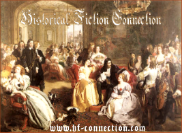3.5 roses
 I have always found the Salem Witch Trials interesting and this book caught my eye. It is the story of the trials and events leading up to it, told through the eyes of Sarah Carrier, daughter of Martha Carrier, who was executed as a witch. The fact that author is a descendant of the Carrier family adds a personal connection to the story that makes it even more gripping.
I have always found the Salem Witch Trials interesting and this book caught my eye. It is the story of the trials and events leading up to it, told through the eyes of Sarah Carrier, daughter of Martha Carrier, who was executed as a witch. The fact that author is a descendant of the Carrier family adds a personal connection to the story that makes it even more gripping.**May contain spoilers**
A letter from Sarah Carrier Chapman to her granddaughter, written in 1752 and explaining how she wants her family to understand the truth behind what happened in Salem, opens the novel and thrusts the reader back in time. The story begins about a year before the trials start when the Carrier family moves to Andover and find they've placed themselves in a community full of fear and superstition. Though out the year leading up to the hysteria we see how people formed the grudges that lead them to turn against neighbors and against family members. The Carrier family finds itself eyed suspiciously almost from the start. Once the witch hysteria grips the area not only are Martha and Sarah accused but her three brothers are as well. Before she is arrested, Martha extracts a promise from Sarah that she will do whatever she must to survive and then entrusts her with a journal that contains the truth about her father's past. Once Sarah, her mother, and brothers are in the Salem jail we get a horrible look at what each day was like for the accused witches. The story ends soon after the children's release and Sarah eventually marries and has a family, though it takes her many years to finally read her mother's journal about her father's past.
The beginning dragged a bit for me though it was essential to the story to see how the different players formed their grudges against each other. There is a feeling of terror and panic as the story builds to the trials, knowing that people are conspiring against the Carrier family and then seeing the ridiculous and insane charges that are brought against not only them but the rest of the accused. The most interesting part of the story for me, besides the descriptions of the trials, was the mystery surrounding Sarah's father - a man of Welsh blood, fought with Cromwell, and is rumored to have been the man who executed King Charles I. I found this whole mystery surrounding Sarah's father intriguing and I wish there had been more about it. The characters are all very well developed with very unique personalities and and it is easy to spot those that will eventually turn against the Carrier family. The main character, Sarah, behaves as a child in that society would have been expected to behave though you do get glimpses of some spark and fire within her. It is easy to see in Martha's character why she was accused of witchcraft; being opinionated and headstrong was not smiled upon, especially in a woman of that time. There is typical tension between mother and daughter throughout the majority of the novel, which really adds to the reality of the characters, but it begins to evaporate when Martha entrusts her with her father's secret and it really vanishes all together once Sarah sees her mother's strength and courage during the trials. The descriptions and details in the novel really help make the time period come alive and the description of the conditions in the jail are absolutely horrific. The last chapter is a bit anti-climactic as it gives the reader a look into what happens to Sarah and her family in the years after the trials. Even though Sarah finally reads about her father's past we aren't really told what it was, merely given a few hints that point in one direction, which was a bit disappointing.
Having never read any fiction about the trials beyond Arthur Miller's The Crucible I found this an interesting and gripping book to read. So much attention is paid to the people of Salem in most works about the trials that you don't see how people in other areas were affected (and it really was quite widespread). I would suggest this to anyone who has an interest in reading about Salem and the witch trials.























No comments:
Post a Comment